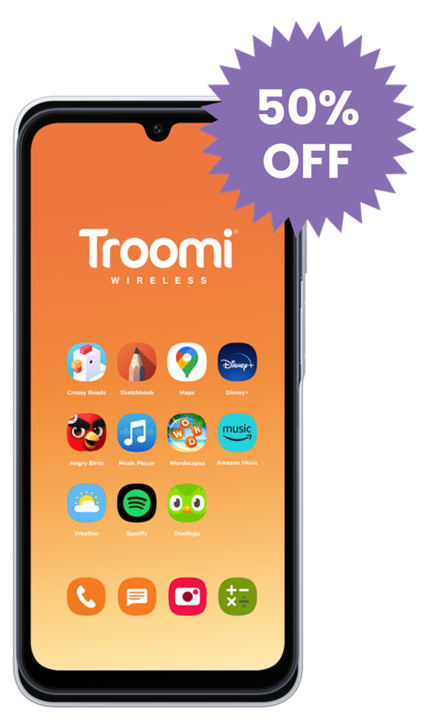Since cell phones became commonplace, teenagers have earned the reputation of being hooked on their handheld devices. Snapping selfies, watching funny videos, texting crushes—cell phones are many teenagers’ main method of communication!
Today’s teens don’t know any different. They’ve grown up in a world fueled by technology! From education to entertainment, everything they need has been a click or tap away all their lives.
But there’s such a thing as too much of a good thing. Excessive screen time is common among tech-loving teens, and that can have a negative impact on their health. Read on to learn more about teens and screens, symptoms of teenage phone addiction, and limiting teenage phone use.
How Many Hours of Screen Time Should a Teenager Have?
First, it’s important to distinguish the screen time teenagers dedicate to education versus entertainment. While neither purpose is “bad” nor “worse” than the other, there’s certainly more value when the screen is used for schoolwork.
According to the 24-Hour Movement Guidelines—robust, well-researched guidelines for physical activity developed by the World Health Organization—teenagers shouldn’t spend more than two hours on the screen recreationally each day.
Recreational screen time includes watching TV, playing video games, and of course, using a cell phone.
Symptoms of Teenage Phone Addiction
Teenagers don’t necessarily turn to their phones to avoid face-to-face communication.
Between intense academics, unique social pressures, extracurricular commitments, after-school jobs, and responsibilities at home, today’s teens are busier and more stressed than yesterday’s. With little room left for in-person social engagements, teens compensate for it with social media and screen time.
According to this report, one in five teenagers spends over five hours on social media each day. Whether they’re attempting to fill a social void or mindlessly scrolling to ward off boredom, excessive screen time can quickly spiral into symptoms of teenage phone addiction:
- Obsessing over or picking apart pictures of themselves.
- Appearing anxious or depressed after using their phone.
- Always wanting their phone nearby.
- Inability to be away from their phone, even for a short time.
- Constantly clicking, tapping, and scrolling on their phone.
- Sensitivity when their screen time is discussed.
- Preferring to be alone or seeming to self-isolate.
- Experiencing difficulty falling or staying asleep.
- Inability to carry on an in-person conversation.
- Neglecting their academic performance.
If you notice any of these changes in your teenager, don’t hesitate to consult with a professional for help.
Limiting Teenage Phone Use
If your teen is beginning to develop unhealthy habits with their cell phone, here’s how you can help them nip their behavior in the bud:
- Establish and enforce screen time limits. Whether their limits are set within a scheduled time window or spread throughout the day, keeping their total screen time under two hours is optimal.
- Keep cell phones, tablets, computers, and TVs in common areas in your home. This will allow you to see exactly how much time your teen is spending on the screen.
- During meals and bedtime routines, turn off and tuck away cell phones and other electronic devices. Not only will this keep your teen’s screen time in check, it’ll help them get a good night’s sleep.
- Discuss cell phone rules with your teen and clearly communicate the consequences they face if the rules are broken. (And be sure your kids understand that these rules and consequences aren’t put in place to make them miserable, but rather to help them develop good habits for the future.)
- Remind your teen that having a cell phone isn’t a right, it’s a privilege—and it can be revoked at any time! Click here to check out our cell phone contract you can use to negotiate terms with your teen.
- Encourage phone-free breaks in the great outdoors! Your teenager can take a walk around the neighborhood, run around the yard, play basketball at the park, or go on a bike ride.
- Consider having screen-free days as a family. Take a weekend trip without phones to focus on connection with one another!
- Lead by example. Take note of your own cell phone use and make changes where needed.
How Troomi Breaks the Chains
Troomi phones are designed to keep kids from depending on electronic devices. Technology should be a tool, not a trap!
Through our unique, remote-access Parent Portal, you can sit down with your teen to set screen time limits, schedules, and other restrictions based on school hours, mealtimes, and bedtime. Making these decisions together can help your teen understand the importance of good tech use and help them take responsibility for their tech choices!
With our KidSmart® Apps and KidSmart® Safe Browser, your kids and teens can safely utilize their cell phones without developing addictive behaviors. No social media, no pornography, no mindless games—everything they have access to will only be for their benefit. Click here to learn more about our mission, and keep coming back to our blog for more parenting tips!


